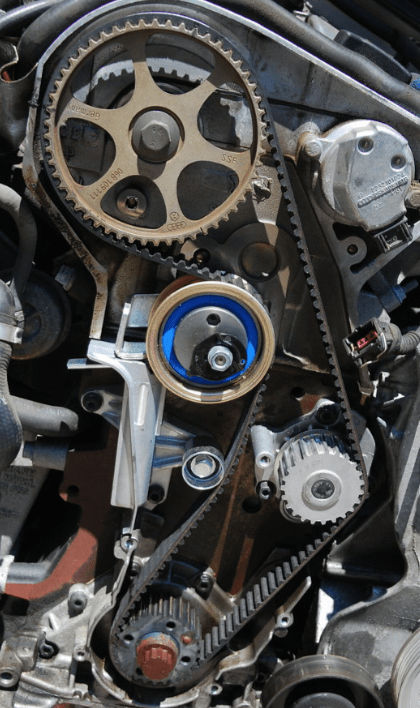A bad timing belt or timing chain can be a serious issue. If it jumps a tooth, or breaks entirely it can lead to permanent engine damage. It’s important to know the symptoms of a bad timing belt or chain, so this doesn’t happen to your Subaru WRX.
Timing belts are made out of rubber and nylon, unlike a timing chain which looks a lot like a bicycle chain. Here’s more on a timing chain vs a timing belt. For all intents and purposes, they create the same symptoms when they go bad.
Timing belts are not that common. You’re much more likely to find a timing chain in cars and trucks than belts. Smaller cars, particularly Japanese made ones, can use timing belts instead of a timing chain. They are most commonly found on four cylinder engines.
Subaru WRX: Bad Timing Belt/Chain Symptoms
Here are some of the most common signs of a bad timing belt on the Subaru WRX:
- Engine Won’t Start– If your WRX’s timing chain or belt has fallen off completely, broken, or has jumped a few teeth, it is entirely possible that the engine won’t even start. You might hear it slapping around as the engine cranks over. If this is the case, the damage is already done.
- Noise– A good indication that a timing belt has gone bad is going to be noise. There may be a sound of rubber beating against something. It’ll typically be a rough rattling sound, and it is often most noticeable right when you start up your WRX.
- Performance Decrease– If the timing belt has jumped a few teeth, but hasn’t fallen or broken off yet, it can knock the engine out of time. The timing belt is responsible for keeping the camshaft(s) in sync with the crankshaft. If the timing belt has moved, that means that the valves will open and close at the wrong time. This will lead to a performance decrease. It’s highly likely that the engine is going to be misfiring as well.
- Loss of Fuel Mileage– Fuel mileage will suffer when the engine is no longer kept in time.
- Glazing and Dry-rot (Timing Belt Only)– If you are looking at the WRX’s timing belt itself, check to see if the belt is glossy. It should grip your finger as you lightly brush across it. If it is slippery and dry, that is a great indication it could be bad as well.
- Check Engine Light– If the timing chain or belt needs replaced due to wear, but hasn’t jumped a tooth, the service engine soon light will not come on. But, if it has jumped, the check engine light will very likely come on. At the least, you should get some sort of misfire relate codes.

Don’t Overlook the Tensioner
The timing tensioner can also go bad. The tensioners job is to keep the right amount of pressure on your Subaru WRX’s timing belt or chain. As the belt/chain stretches through normal operation, it would get loose and fall off or jump. The tensioner keeps this from happening by keeping a consistent amount of force on the belt. So, as the belt stretches it adjusts for this stretching. If the tensioner is no longer keeping enough pressure on the timing belt, it’ll cause it to fail.
If you are going to replace the tensioner, make sure to swap the belt as well. It’s so hard to get to, and timing belts/chains are relatively affordable. It’s just the TIME that it would take you or your mechanic to get to it that’s the problem.
Conclusion: Subaru WRX Timing Chain Symptoms
Most manufacturers will recommend changing the timing belt at 60k or 100k miles. There isn’t usually a service window at all for the chains. Although, it can vary. Where a lot of people get into trouble is when they buy a used car with 100k no realizing that the belt service is going to be immediately due.
Good luck with your WRX. If there is anything that you would like to add, please leave a comment below. We would appreciate it.

